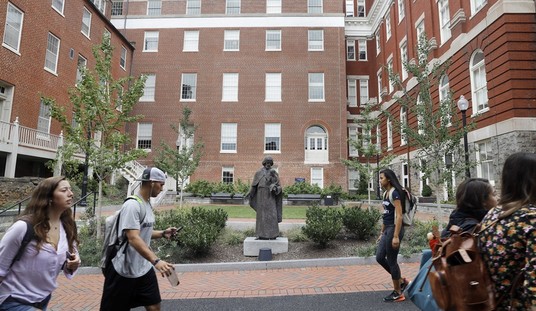Last night was the first serious, substantive debate held with the Republican candidates, and congratulations are due both to Fox Business Channel and to RNC Chairman Reince Priebus. FBM asked serious questions and refrained from “gotcha” tactics, and Priebus — who was actually greeted like a rock star by the crowd before the broadcast began — may have successfully intimidated FBN into avoiding any semblance of CNBC’s outrageous performance.
The Milwaukee Theatre has a seating capacity of about 3,000. From my point of view, just about every seat in the place was occupied. Ticket holders were informed that the doors would open at 4:30 and everyone was to be seated by 5:30 when the doors would be closed; I arrived about 15 minutes early and found myself at the end of a queue roughly a city block long. Nevertheless, attendees were enthusiastic despite the line and the promise of a four-and-a-half-hour, two-debate session. (There were commercial breaks, of course, as well as the long break between the first and second debates during which people could stretch, go to the facilities, and so on, but it was nonetheless heartening to see).
The crowd was orderly and well-mannered — typical of the Midwest, and especially Midwestern Republicans. The same could not be said for the leftist protesters outside.
Police estimated that 1,200 protesters showed up, confined by police barricades to an area a block or so away from the theatre. This was no organized protest. They were at times rowdy and often conflicted; they consisted of small, competing groups representing all the usual Leftist constituencies and pathologies. Chants melded together and interfered with each other, making them difficult to understand. The effect was a general, angry noise.
Generally speaking, I felt most participants in both debates handled themselves well. I didn’t have the impression either personally or from the audience that there were any particular winners in either session.
There were, however, a couple losers: John Kasich and Donald Trump were both greeted several times by rather loud boos.
Particularly bad for Kasich was the exchange about bank bailouts. The question was first addressed to Jeb Bush: would he allow banks to fail, or would he bail them out with taxpayer money? In an adroit attempt to sidestep the direct answer, Bush spoke of preventing it from happening in the first place by repealing the Dodd-Frank regulations which severely hobble smaller enterprises, and by raising the required levels of capitalization of banks in general so that competition could prevent any from being “too big to fail.” In his only significant misstep of the night, Bush claimed this would prevent a financial crisis from ever happening again. He backtracked and tried to clarify that he was referring to the specific 2008 crisis.
Ted Cruz said categorically that he would allow the banks to fail and allow the bankruptcy laws to work on them. In a follow-up, he suggested that there is a role to be played by the Federal Reserve system, as a lender of last resort to stricken banks along the lines of the function of a European-style central bank.
Kasich, for reasons entirely unclear, chose to ignore what Cruz actually said. Kasich claimed that allowing such banks to fail would wipe out the savings of a lot of people who could not “afford” the loss; he said that his government would decide who could afford to take the loss and who could not. The crowd expressed extreme displeasure. Per today’s recaps, it sounded as bad on television as it did in the theater.
Donald Trump did himself no favors in the debate. His answers were vague, thin in substance despite quality questions designed to elicit substantive answers, and made simple factual errors. For example, he criticized the Trans-Pacific Partnership as a terrible deal, because it would allow China to seize even more of the market in the United States for manufactured goods. Rand Paul had to remind him that China is not one of the signatories to the agreement.
Trump demonstrated a thin skin by interrupting others, then complaining when Carly Fiorina interrupted him. From inside the theater, Trump seemed unable to tell the difference between the crowd laughing with him or at him. The latter was far more often the case, at least around me in the orchestra section.
Rand Paul also received a share of audience disapproval of his foreign policy stance. That said, he gamely held to his principles, unpopular as they were (in one of the few ad hominem moments in the debate, Florida Senator Marco Rubio called him a “dedicated isolationist,” and won applause for it).
To my ears, the weakest applause during closing statements was rendered to Kasich, then Trump, and then Paul. The strongest applause: Rubio, Carson, and Cruz.









Join the conversation as a VIP Member